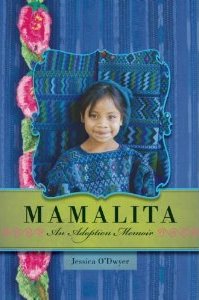Jessica O’Dwyer knows Guatemala. She and her husband Tim adopted two children, Olivia and Mateo, from the land of eternal spring. Her memoir, Mamalita, is a beautiful account of her dogged pursuit to complete Olivia’s stalled adoption—even quitting her job to move to Antigua! In the past 12 years, Jessica and her family have been back to visit Guatemala many times, and have intentionally cultivated a connection with their children’s country of birth. We interviewed Jessica about writing the book and the ways in which she stays connected with Guatemala. Enjoy!
Why did you choose to adopt from Guatemala?
Adoption is such an enormous choice and undertaking that I view this question as having two parts: First, why did you choose adoption, and second, why Guatemala?
Like many women, I assumed I would give birth to biological children and in fact, felt a strong yearning to parent. But life for me held other plans. At age 32, I went through menopause. Thanks to scientific advances, couples and individuals faced with fertility challenges such as mine can avail themselves of medical interventions to create a family in a way that makes sense for them. For reasons that made sense to us, my husband, Tim, and I elected to pursue adoption.
We chose to adopt internationally because, again, that decision made sense for us. We decided on Guatemala because two social workers we consulted recommended Guatemala as the country they would adopt from: the children were healthy, and, instead of living for months or years in large orphanages, mostly were cared for in small foster homes. We knew that the country would remain a big part of our lives for the rest of our lives, and Guatemala was close enough to visit, with a language we felt we could learn. Finally, my family is Catholic, and Guatemala is a (historically) Catholic country. Religion was something we could share.
At what point in the process did you decide to write the memoir? What was your motivation for writing the book?
Every day during my daughter Olivia’s adoption, I wrote about what was happening and how I felt about it. The writer in me could see a story unfolding. About a year into the adoption, I quit my job as a publicist at the San Francisco Museum of Modern Art, and moved to Antigua, Guatemala, where I rented a small house to live with Olivia and complete the adoption myself.
I wasn’t the only would-be adoptive mother who’d moved to Antigua to sort out a stalled adoption—another seven or eight also came and went. As the days passed—with an additional stamp required, or new signature requested, or a vital document somehow misplaced—the other moms used to say “Somebody needs to write a book about this.” That planted the seed.
In what ways does your family continue to be involved with Guatemala? How do you encourage them to learn about their culture, both at home and during your travels? Why was it important to you to bring them back to Guatemala?
We have searched for and found each of our kids’ birth mothers, and visit at least once a year. (Olivia is almost 12, and our son, Mateo, 9.) We support several USA-administered NGOs in Guatemala, and in past visits, have participated in their missions—carrying donated shoes and clothes; meeting with sponsored students and families; checking in on medical clinics, homes for the abandoned elderly, and a convent of sisters; and helping paint the exterior of an orphanage. Our house in California is filled with art and textiles from Guatemala; any exhibitions of things Central American—whether in an art or cultural center locally—we make an effort to view. Guatemala is, and always will be, a part of who we are as a family.
What are Olivia and Mateo’s reactions to traveling through Guatemala? How do you help them process the poverty and lack of opportunity they see in their home country?
Because Olivia and Mateo have been visiting since they were very young, they’re accustomed to Guatemala. They understand that some people don’t have electricity or running water, and that the floors of houses can be dirt. That the children often don’t have the same school supplies, or even books. Harder for them to understand is why kids stop going to school at such a young age. They know the kids must work to help their families, or that the teachers might not speak the students’ native language, but they still don’t get why kids aren’t “made” to go to school.
At the same time, Guatemala possesses tremendous wealth. My children see a disconnect between, say, the shopping mall at Tikal Futura, and the garbage dump a few miles away.
But by far the incident that made the biggest impact on Mateo—Olivia missed this trip—was a visit to an orphanage. To see the cement wall around the compound, and inside, bunk beds lined up, the posted schedule and meals—Mateo still is haunted by the experience. “Does anyone visit the kids?” he asks. “Will they ever be adopted?”
What is your advice to other families who have adopted internationally for keeping their kids connected to their culture?
Nearly 12 years into adoptive parenting, I’ve learned that equally as important as staying connected to our kids’ culture is staying connected to each other. And by that I mean our adoption community. Reach out. Find your network. Connect. Whether in-person or online, establish relationships with other adoptive parents, and nurture them. You need this, and your children do, too.
We belong to a group who meets several times a year. At first, our kids rebelled at having to attend activities, but over time, friendships have developed. Who else can understand what it feels like to be a child born in Guatemala and adopted to a family living in the United States, except another child born in Guatemala adopted to a family living in the United States? Give that gift to your child. In addition, we meet up with other families like ours in Guatemala or at heritage camp. These reunions are a highlight of our year.
As far as culture: Like biological parents, every adoptive parent is different. Some love to travel; others never want to leave home. Some have the means to visit Guatemala with regularity; others will be thrilled if they can go once in a decade. For families considering their first visit back, I say “Make it fun.” Join a group tour of other adoptive families, where you and your children will discover Guatemala together. Visit Antigua, Lake Atitlan, Tikal. Learn the language, climb a volcano, study the textiles.
How lucky we are to be involved with such a rich and fascinating culture and history. Take advantage of that.
As you know, international adoption from Guatemala is closed, yet many families still have children stuck in the system. What would be your advice to those families?
Every day, for more than six years, the waiting parents and their children have personified the true meaning of courage, steadfastness, and love. To each of them, I offer no advice–only admiration, prayers, and hope for resolution.
Interested in reading Jessica’s book? Learn more about the book from this compelling trailer.


I read the book, and found it helpful in my attempts to understand Guatemala and adoption of Guatemalan children. My grandson was adopted from Guatemala 7 1/2 years ago, and thankfully it was not a traumatic experience like Jessica had.
I’m glad you found the book to be helpful too! It’s a fascinating look into the process and their experience.